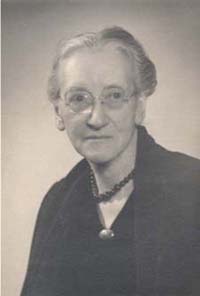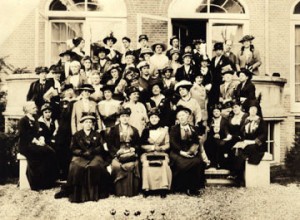 Histories on the Edge/Histoires sur la brèche
Histories on the Edge/Histoires sur la brèche
Toronto: May 22-25, 2014
Proposals due: January 15, 2013
The sixteenth Berkshire Conference on Women’s History will be held in Toronto on May 22-25, 2014. The University of Toronto will host the first Canadian “Big Berks” in collaboration with co-sponsoring units and universities in Toronto and across Canada.
Our major theme of Histories on the Edge/Histoires sur la brèche reflects the growing internationalization of the Berkshire conference. It recognizes the precariousness of a world in which the edged-out millions demand transformation, as well as the intellectual edges scholars have crossed and worked to bridge in the academy and outside of it. The conference in Canada prompts engagement with critical edges – sharpening, de-centring, decolonizing histories. Edges are spatial: impenetrable borders, stifling or protective boundaries, and spaces of smooth entry. Edges are temporal; they also evoke the creative and the avant-garde. Entangled in the idea of edges are rough encounters, jagged conflicts as well as intimate exchanges. It speaks to the alternative spaces the “edged-out” have carved for themselves and to efforts made to create a common ground, or commons, on which to make oppositional histories.
As a nation-state shaped by imperialist histories and its own colonial dynamics, Canada itself sits on the edge of a powerful if, perhaps, waning American empire. Like other white settler societies, it is a colonial state that has operated through dispossessing First Nations peoples, guarding the edges of white citizenship, and endorsing patriarchal models of assimilation; yet, this history unfolds and is resisted in myriad ways. Its historical trajectory, on the edges of empire, includes colonization first by the French with the resulting ongoing Francophone presence, and later the British. Its distinctive features include socialized medicine, same-sex marriage, and official but contested multiculturalism. On Anishinabe land, Toronto, a creative, cosmopolitan, and contested city, is both “home” and “elsewhere” for many of its diasporic residents. What better place to consider edges as sites of hope, excitement, and possibility but also of danger, displacement, struggle, and exile?
Because change so often emerges from edges, however slowly, painfully or partially, we invite “on the edge”
histories of all locales and time periods. We invite in particular histories of the Caribbean and Latin America, Asia and the Pacific, Africa and the Middle East, and Indigenous, francophone and diasporic cultures around the world. We welcome papers that focus on bodies and objects on edges of all kinds. The theme also invites work that queers gender and sexual binaries. How can we historicize emergent, residual, and ongoing gender constructs such as ‘masculine’
and ‘feminine’ as well as gender performances, sexual practices, and social identifications that challenge binary modes of gender and sexuality?
Our theme encourages critical reflection on how gender works. Gender has its many ragged edges: where private and public spheres, and masculinity and femininity, have been defined and redefined; where class, gender, race, ethnicity, nation, kinship, sexuality, and ability/disability have interacted. So, too, is gender on the edge of debate: a term in need of scrutiny to expose its uses, contradictions, strengths, and weaknesses.
The theme respects feminist theory and praxis as a critical stance in need of constant interrogation. We invite work on western and non-western feminisms and scrutiny of feminisms within the context of historically shifting power relations and international alignmentare positioned, seek to destabilize the centre and authorize the margin? Or sharpen our critique in a world that, now, as so often in the past, stands seemingly on the brink?
We encourage comparative or transnational panels organized along thematic lines, even in the case of the more regionally-based subthemes. We especially invite conversations across centuries, cultures, locales, and generations.
Proposals will be vetted by transnational subcommittees of scholars with expertise in particular thematic fields. All proposals must be directed to ONE of the subthemes and be submitted electronically. In formulating your proposal for one of the subcommittees, you are NOT required to address every topic in the thematic thread. Please list a second choice of subtheme, but do not submit to more than one subcommittee.
Preference will be given to discussions of any topic across national boundaries, including for the regional subthemes, with special consideration for pre-modern (ancient, medieval, early modern) periods. However, single papers and proposals that fall within any single nation/region will also be given full consideration. As a forum dedicated to encouraging innovative, cross-disciplinary scholarship, and transnational conversation, we invite submissions from graduate students, international scholars, independent scholars, filmmakers, educators, curators, artists, activists, and welcome a variety of perspectives.
The organizer of the paper, panel, roundtable or workshop is responsible for submitting all of the material.
Types of Sessions: (to submit a proposal, you will be an “author” on the submission site)
Individual Papers: The submission file should include your name, paper title, and a 250-word abstract. Please also submit a short bio.
Panels: Three papers (20 minutes each), a chair, and a separate commentator. (We will also consider 2 or 4 papers). The submission file should include the author, title, and a 250-word abstract for each paper as well as a panel title, the organizer’s name, and a 500-word summary abstract. Please also submit a short bio for each participant.
Roundtables: Four to six presenters and a chair who may also act a facilitator. The focus is on collegial discussion within the group and between the group and audience. The submission file should include the roundtable’s title, the organizer’s name, a 500-word summary abstract, and a list of the participants with a brief description of their contribution to the roundtable. Please submit a short bio for each participant.
Workshops: Six to nine pre-circulated papers, with a chair and a separate discussant. (We will consider up to 10 papers.) Papers will be due April 30, 2014 and will be pre-circulated by posting on a website accessible to all the conference registrants. The submission file should include the author, title, and a 250 word abstract for each paper as well as a workshop title, the organizer’s name, and a 500-word summary abstract. Please submit a short bio for each participant.
Both participants and audience will engage in a focused conversation.
Submit to ONE of the Subthemes (on the
submission site, these themes are called tracks)
*Borders, Encounters, Borderlands, Conflict Zones, and Memory
*Empires, Nations, and the Commons
*Law, Family Entanglements, Courts, Criminality, and Prisons
*Bodies, Health, Medical Technologies, and Science
*Indigenous Histories and Indigenous Worlds
*Caribbean, Latin America, and Afro/Francophone Worlds
*Asia, Transnational Circuits, and Global Diasporas
*Economies, Environments, Labour, and Consumption
*Sexualities, Genders/LGBTIQ2, and Intimacies
*Politics, Religions/Beliefs, and Feminisms
*Visual, Material, Media Cultures: Print, Image, Object, Sound, Performance
Access the Submission Site on the
Berkshire Conference website:
http://berksconference.org
![]() The Women’s Studies Program at Texas Tech University presents the 29th Annual Conference on the Advancement of Women. This two-day conference will kick off with a pre-conference evening event on Thursday, April 4 and continue the following day on Friday, April 5 with simultaneous panel sessions conducted throughout the day on the upper level of the Student Union Building. This conference occurs each spring on the campus. This year’s theme is “Women and Global Change: Achieving Peace through Empowering Women – Part II”. Concurrent panel sessions for Friday will be held in the Student Union Building (upper level) in assigned rooms from 8:30 a.m. – 5:00 p.m. Guest speakers will be featured in the morning and lunch hour. For more details on the call for papers, schedule of events for both days, information on the conference program, conference registration fees, etc. please visit our web site.
The Women’s Studies Program at Texas Tech University presents the 29th Annual Conference on the Advancement of Women. This two-day conference will kick off with a pre-conference evening event on Thursday, April 4 and continue the following day on Friday, April 5 with simultaneous panel sessions conducted throughout the day on the upper level of the Student Union Building. This conference occurs each spring on the campus. This year’s theme is “Women and Global Change: Achieving Peace through Empowering Women – Part II”. Concurrent panel sessions for Friday will be held in the Student Union Building (upper level) in assigned rooms from 8:30 a.m. – 5:00 p.m. Guest speakers will be featured in the morning and lunch hour. For more details on the call for papers, schedule of events for both days, information on the conference program, conference registration fees, etc. please visit our web site.






